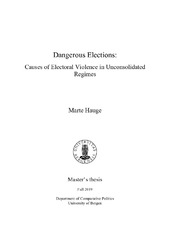Dangerous Elections: Causes of Electoral Violence in Unconsolidated Regimes
Master thesis
Permanent lenke
https://hdl.handle.net/1956/21065Utgivelsesdato
2019-12-10Metadata
Vis full innførselSamlinger
- Master theses [113]
Sammendrag
Most countries in the world today use elections as a method of transferring political power and bring legitimacy to ruling incumbents. However, some elections are marred by wide-spread electoral violence, a specific sub-category of political violence. What are the causes of electoral violence in unconsolidated regimes? This is the research question of this thesis. I use a new and global dataset on election-related violence in 136 countries from 1990 to 2012, adding up to a total of 1,184 election rounds. This is combined with additional country-level and election-level data. Previous studies on the phenomenon of electoral violence have been limited by lack of disaggregated data which establishes a substantive link between elections and violence, or by quantitative data limited to the much-studied continent of Africa. In this thesis, I attempt to take full advantage of the new and improved dataset, by studying the causes of different types of election violence, distinguished by perpetrators (government, pro-government and opposition actors) and timing (pre-election and post-election). The different camps of actors can have different incentives to resort to electoral violence, and dynamics of election violence can differ before and after the elections, as the terms of the contest is suggested to change. I find some support for the all the hypotheses regarding electoral system, ethno-political exclusion, economic inequality, executive constraints, uncertainty of outcome of the election and post-election protest, although not for all types of election violence.
